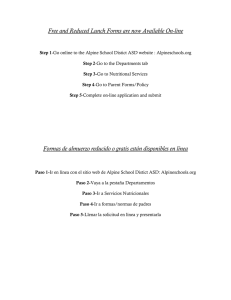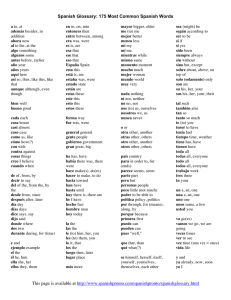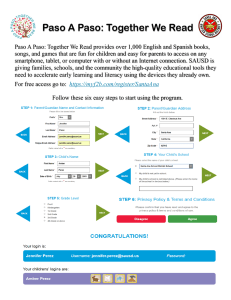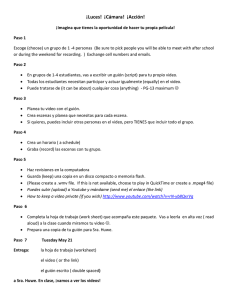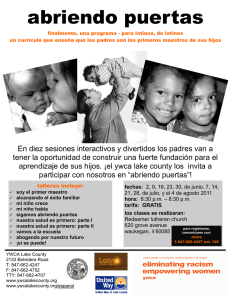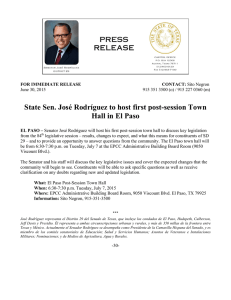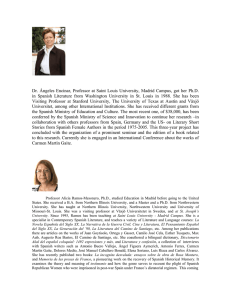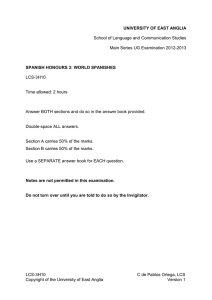AP Spanish Lang. Syllabus 2013 - San Jose Unified School District
Anuncio
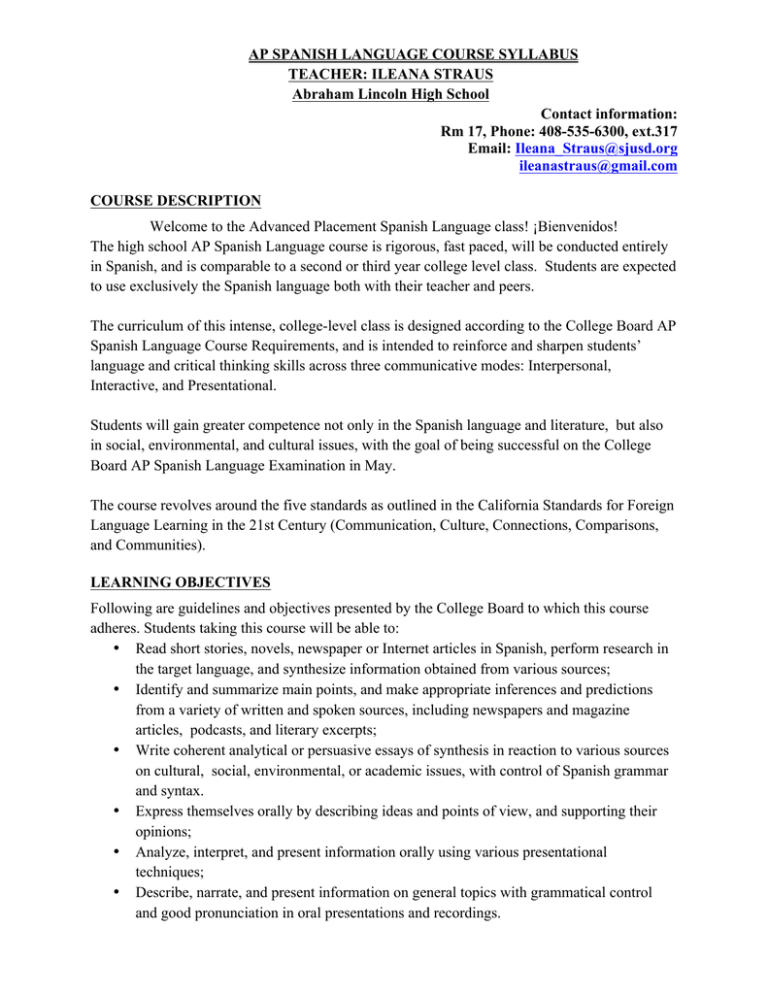
AP SPANISH LANGUAGE COURSE SYLLABUS TEACHER: ILEANA STRAUS Abraham Lincoln High School Contact information: Rm 17, Phone: 408-535-6300, ext.317 Email: [email protected] [email protected] COURSE DESCRIPTION Welcome to the Advanced Placement Spanish Language class! ¡Bienvenidos! The high school AP Spanish Language course is rigorous, fast paced, will be conducted entirely in Spanish, and is comparable to a second or third year college level class. Students are expected to use exclusively the Spanish language both with their teacher and peers. The curriculum of this intense, college-level class is designed according to the College Board AP Spanish Language Course Requirements, and is intended to reinforce and sharpen students’ language and critical thinking skills across three communicative modes: Interpersonal, Interactive, and Presentational. Students will gain greater competence not only in the Spanish language and literature, but also in social, environmental, and cultural issues, with the goal of being successful on the College Board AP Spanish Language Examination in May. The course revolves around the five standards as outlined in the California Standards for Foreign Language Learning in the 21st Century (Communication, Culture, Connections, Comparisons, and Communities). LEARNING OBJECTIVES Following are guidelines and objectives presented by the College Board to which this course adheres. Students taking this course will be able to: • Read short stories, novels, newspaper or Internet articles in Spanish, perform research in the target language, and synthesize information obtained from various sources; • Identify and summarize main points, and make appropriate inferences and predictions from a variety of written and spoken sources, including newspapers and magazine articles, podcasts, and literary excerpts; • Write coherent analytical or persuasive essays of synthesis in reaction to various sources on cultural, social, environmental, or academic issues, with control of Spanish grammar and syntax. • Express themselves orally by describing ideas and points of view, and supporting their opinions; • Analyze, interpret, and present information orally using various presentational techniques; • Describe, narrate, and present information on general topics with grammatical control and good pronunciation in oral presentations and recordings. • • • • • Synthesize information from sources provided to write and present a well supported opinion. Interpret linguistic cues to infer social relationships. Communicate via formal and informal written correspondence. Initiate, maintain, and close a spontaneous conversation on a familiar or social topic. Broaden their understanding and knowledge of the rich cultures of the Spanish speaking world through the study of literature, history, art, music, and current events. INSTRUCTIONAL ACTIVITIES The class is conducted entirely in Spanish. All students are expected to use exclusively the Spanish language consistently both with their teacher and peers. The goal of the activities is to develop critical thinking skills in Spanish, gain greater competence in Reading Comprehension, Writing, Speaking, and Communicating in Spanish, while at the same time continually broadening vocabulary and reinforcing grammar skills. • Critical reading activites, essay writing, structural/grammar review and practice; • Listening comprehension practice with CD’s, films, podcasts, and other sources; • Reading and analyzing a variety of literary texts/genres in Spanish; • Discussing cultural topics, current events, expressing opinions on various topics; • Projects that enhance students' academic and linguistic potential. TEXTS & INSTRUCTIONAL MATERIALS: 1. Literature/Reading Text: Abriendo Paso Lectura, and various other document sources provided by the teacher. 2. Grammar: Abriendo Paso Gramática, Repaso workbook, Una vez más gramar review book and exams. 3. Other sources: Literatura moderna hispánica, Aproximaciones al studio de la literatura hispánica, newspaper & magazine articles, newscasts; 4. Listening: CD’s, Internet sources, films, podcasts, guest speakers; 5. Other materials: dictionaries, internet, online resources from the College Board: http://apcentral.collegeboard.com/apc/public/courses/ 6. AP test practice books and preparation materials. 7. Two novels (to be announced) Course Outline • Our school uses Abriendo Paso Lectura y Gramática, Repaso, a Complete Review Workbook for Grammar, Communication and Culture as the general core AP language textbooks, which I complement with many other materials from Una vez más, Encuentros maravillosos: Gramática a través de la literatura, Authentik en español (magazine), and various Internet sources, Aproximaciones al studio de la literatura hispánica, plus two short novels. • Abriendo Paso Lectura y Gramática provide students with a thematic approach to literature and grammar, and have a wealth of communicative activities focusing around controversial topics which give students ample opportunities to interact with each other in class. • • The activities of each chapter are tied to a specific theme, and focus class discussions on the respective topic while at the same time stimulate usage of grammatical structures, especially with the help of Una vez más, and Repaso. I present all grammatical structures in Power Point format which students can also access on my webpage, and also access additional practice activities online. For each thematic unit, students are provided with extensive vocabulary building activities, reflection and interpretation activities stimulating their critical thinking skills, and post-reading discussion and writing topics. Each unit culminates with an oral presentation or an essay in the style of the AP formal writing section. Students submit the essays to me first as a draft, and then after making revisions, resubmit it as a final essay for a grade based on AP scoring rubric. Listening Skills Activities (C3, C7) • • • • • Students listen to audio sources that I select integrating the Unit theme. I found a lot of great sources in Authentik en español which comes with a CD accompanied by useful printed materials and student activities. The goal is to listen for information in order to extract main ideas, synthesize, compare and contrast, sharpen listening skill, enrich vocabulary and learn something interesting. After listening, students work in small groups sharing their understanding of the themes, finding supporting details, connecting ideas, and debriefing. Video clips and DVD’s are provided without subtitles to enhance listening comprehension skills. Students listen to the CD’s accompanying Abriendo Paso which have listening comprehension questions and speaking activities. Other sources for listening activities: o The College Board: http://apcentral.collegeboard.com/apc/public/courses/teachers_corner/3499.html o CNN en español: www.cnn.com/español/ o BBC: www.bbcmundo.com o Radio Naciones Unidas: www.un.org/radio/es o Nuevos Horizontes: www.nuevoshorizontes.org o Music CD’s with meaningful lyrics (Mercedes Sosa, Enrique Iglesias, Juanes, Maná, others) o Videos accompanied by critical thinking activites: El laberinto del fauno, La historia oficial, Diarios de motociclista, La misma luna. Reading Skills Activities § You will read not only in order to develop vocabulary and linguistic skills, but also to understand the meanings below the surface level of the plot. You will discover and analyze themes, characters, concepts, attitudes, understand figures of style, humor, different literary genres, and how to appreciate the beauty and complexity of the Spanish language. § You will transfer these skills to other disciplines, and be prepared to continue with AP Spanish Literature the following year. § In order to expose students to various styles and types of literature, I use the following reading sources: o Literatura moderna hispánica (an anthology edited by J.R.González o Abriendo Paso Lectura (2007, Prentice Hall by José Díaz, Stephen Collins) o Encuentros maravillosos: Gramática a través de la literatura (Scott Foresman, Addison Wesley) o Aproximaciones al estudio de la literatura hispánica (Quinta Edición, McGrawHill Higher Education) o Authentik en español (bimonthly magazine and CD) o BBC: www.bbcmundo.com o El Mundo: www.elmundo.es/ Speaking Skills Activities We will have daily lively discussions in class provoked by the controversial topics in Abriendo Pas, and current events. Students love to argue and debate in small groups, and then present their pro’s and con’s on various themes, from sports to family, from politics to love, from the environment to life and death. • To encourage speaking, we will conduct debates, and do role-playing activities impersonating various characters from the literary works we read. Abriendo Paso Lectura has many critical thinking activities which I adapt for the readings. Sometimes small groups analyze various sections of a story, and present it to the rest of the class interpreting parts of the text, inventing new endings, or modernizing the situations. • Students will prepare and present several projects based on the unit themes, newspaper or magazine articles, customs and traditions, music, art, history, global issues, and the environment. OTHER RESOURCES: • AP Central http://apcentral.collegeboard.com • http://apcentral.collegeboard.com/members/article/1,3046,151-165-0-50015,00.html • AP Test Preparation books and practice materials provided by teacher • Other sources: Literatura moderna hispánica, Aproximaciones, newspaper & magazine articles, online resources. • Listening: CD’s , films, internet, podcasts guest speakers; • Other: dictionaries, internet, TV interviews, PowerPoints, maps, art reproductions; • AP exam practice books and preparation materials. • Two novels (to be announced) • EXPECTATIONS AND RECOMMENDATIONS FOR SUCCESS 1. Daily participation in class activities ¡en español! is crucial and expected. 2. Keep a 3-ring binder for notes, homework, and handouts. 3. Organize binder in 3 sections: 1)weekly calendar, assignments; 2)vocabulary lists, grammar handouts; 3) essays, corrected tests, resources. 4. Bring your book, binder, writing instruments, and a positive attitude to class daily; 5. Reserve 30-45 minutes every night for homework. 6. Check calendar, and turn in work even if absent. It is your responsibility, and the purpose of the calendar! 7. Meet deadlines, be responsible for make-ups, and manage time effectively. 8. Attend every class and be punctual. Poor attendance as well as tardiness will result in loss of participation points. 9. Attend mandatory tutorials and AP practice sessions in April to prepare for the AP exam. GRADING: Grades reflect performance on the following weighted categories throughout the semester: Class participation (oral and written) 15% Homework & AP Tutorials 15% Projects/Essays/Presentations 20% Final Exam 15% Tests/Quizzes 35% Course Planner First Semester Thematic Units adapted from Abriendo Paso Resources for grammar, vocabulary, and communication Reading resources: Abriendo paso, Literatura moderna hispánica, Triangulo, Aproximaciones Resources for interpersonal communication, culture, authentic sources, listening practice Los estereotípos culturales y sociales Magazine Articles Podcasts Unit 1: Los estereotípos sociales; El hombre y la mujer en el mundo actual Capitulo 1 Una vez más, Repaso Preterite & Imperfect Tenses El décimo (Emilia Pardo Bazan) Máscaras mexicanas (Octavio Paz) El machismo y el marianismo (articles) Lección sobre ruedas (Domitila B. Chungara) Hombre pequeñito (Alfonsina Storni) Unit 2: La tecnología, La brecha generacional Capitulos 2 & 7 Repaso, Una vez más Future and Future Perfect tenses Unit 3: Costumbres y tradiciones Capítulo 3 Abriendo Paso, Una vez más, Repaso, The Perfect Tenses Rosa (Angel Balzarino) Nosotros, no (Jose Bernardo Adolph) El estudiante film unit, no subtitles El día de los muertos Información cultural, Epitáfios La Llorona – leyenda Macario (Novel by B.Traven) Listening Comprehension CD’s Capítulo 2 & &7) -DVD El Estudiante Legend Artcles Macario video accompanying the novel Authentik article, -CD Abriendo Paso DVD clip Como agua para chocolate Unit 4: La familia, Los conflictos entre generaciones Capítulo 4, Abriendo paso, Una vez más, Encuentros Maravillosos Jaque mate en dos jugadas (Isaac Aisenberg) Como agua para chocolatefragmento (Laura Esquivel) No oyes ladrar los perros (Juan Rulfo) Unit 5 La inmigración, Como adaptarse a otra cultura Capítulo 5 Abriendo paso,Object pronouns, Reflexive verbs Cajas de Carton (Francisco Jimenez) DVD la misma luna-unit Final exam Mock AP Spanish Language Exam Combination of past AP language released exams, formal writing question related to the readings Newpaper articles, CD Abriendo Paso DVD compare and contrast AP Spanish Preparing for the language examination (Jose Diaz), Barron’s AP Spanish Exam Second semester Unit 6: El realismo mágico, Los conflictos sociales, La vida y la muerte Capítulos 4 & 9 Abriendo Paso, Una vez mas, Conditional, Present and Imperfect Subjunctive Continuidad de los parques (Julio Cortazar) El arbol de oro (Ana Maria Matute) Magical realism lecture CD’s Abriendo paso and podcasts DVD- El laberinto del fauno Proyecto Lorca Unit Unit 7: Poetry as a genre. Figures of style, literary analysis. Poetry Unit: Chapters 14-22 Poems by Pablo Neruda, Alfonsina Storni, Gustavo Adolfo Béquer, Gloria Fuertes, José Martí, , Rubén Darío, Juana de Ibarbourou, Federico García Lorca, etc. Puedo escribir los versos, Me gustas cuando callas, Rimas, Despedida, Versos sencillos, Canción de otoño en la primavera, Los pájaros de no sé donde, La higuera, Romance de la luna, Romance somnámbulo, Un Oso y un amor (Sabine Ulibarri), Cartas de amor traicionado (Isabel Allende) Literatura moderna hispánica, Abriendo Paso Lectura, Writing Poems in the style of Neruda, and Lorca. Unit 8: El amor, La Imaginación y la fantasía, Sueños y realidad Capítulos 3 & 12 Abriendo Paso, Una vez más, the Subjunctive Tenses Unit 9: La ley, la libertad individual & Los derechos humanos Capítulo 11 Abriendo paso, Repaso, Una vez más La viuda de Montiel, (Gabriel G. Márquez) El delantal blanco (Sergio Vodanovic) El crimen, la violencia, los derechos humanos Podcasts Role playing -theater Capítulos 23 – 26 Abriendo paso, La fiesta de San Fermin La Tomatina Los indios cuna CD Abriendo paso Video clips Newspaper articles Strategies and practice activities for the AP exam: Listening Comprehension; Reading critically; Writing formal and informal essays; Speaking & Recordings Cultural Research Projects Culminating presentations are the final for the second semester. Creative Writing Projects AP Spanish Preparing for the language examination (José Diaz), Triángulo, Abriendo paso AP Spanish Preparing for the language examination (José Díaz), Triángulo, Abriendo paso Unit 10: De la prensa: Customs and Traditions Unit 11: AP Exam Practice After AP Exam Cultural and cross curricular topics Creative Writing Projects Autentik, article, CD Abriendo paso CD Podcasts Música y poesía Various sources, mostly online
